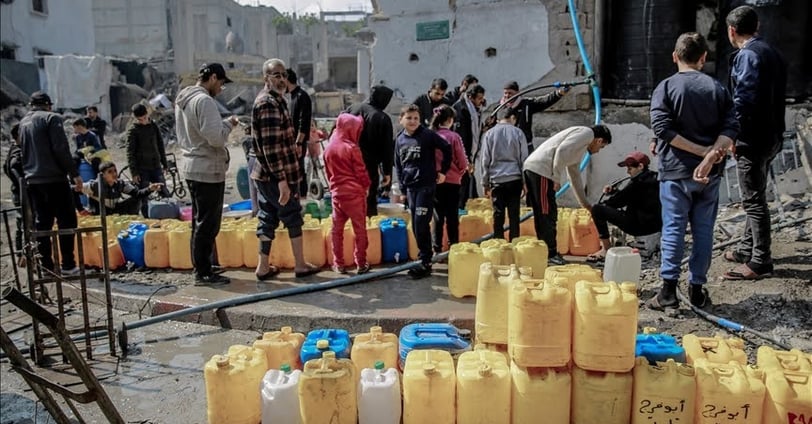Water Crisis in Gaza: A Deepening Humanitarian Catastrophe Amid Genocide and Forced Displacement
Gaza faces a deepening water crisis amid relentless conflict. Learn how destroyed infrastructure, rising temperatures, and fuel shortages have turned water into a daily lifeline, and why urgent global action is vital to prevent a public health catastrophe.
NEWSREPORT
Refaat Ibrahim
6/24/20253 min read


Escalating Water Shortages Amid Continuous Conflict
Since the start of the Israeli offensive, the Gaza Strip has been engulfed in an unprecedented humanitarian crisis, with water scarcity emerging as one of its most imminent threats. As repeated displacement and infrastructure destruction continue, over two million Palestinians are battling daily for access to clean drinking water. Widespread bombing has devastated water and sewage networks, caused power outages, and shut down desalination plants, transforming water into a vital essential for survival.
The water crisis in Gaza, though longstanding, has turned catastrophic in recent weeks. As summer temperatures soar, so does the demand for water while supply dwindles. Internally displaced families, forced from their homes into overcrowded schools or makeshift refugee camps, endure prolonged water cutoffs lasting weeks. This dire shortage fuels the spread of infectious and skin diseases.
Infrastructure Collapse: The Root of the Crisis
The crisis stems largely from the deliberate destruction of Gaza’s water infrastructure. UN Special Rapporteur Pedro Arroyo Agudo has stated that roughly 70% of the water network, wells, pumping stations, pipelines, and sewage treatment plants have been damaged by Israeli military operations. This extensive destruction has rendered clean water nearly inaccessible in many communities.
Since the conflict began, a major pipeline serving central Gaza, an essential water source, has been cut off, depriving hundreds of thousands since January. Combined with chronic electricity shortages and a lack of fuel, most desalination plants and wells have been unable to operate. The siege also prevents repair crews from accessing damaged sites, further complicating relief efforts.
Everyday Struggles for Water
The consequences of this crisis extend beyond thirst. Displaced families in camps or informal shelters face severe shortages for drinking, cooking, washing, and personal hygiene. These conditions particularly endanger children, the elderly, and those with weakened health, who often travel long distances for questionable water sources.
The shortage also heightens the risk of serious health issues. Contaminated water and damaged sewage systems have led to outbreaks of waterborne illnesses, and aid organizations warn of escalating public health dangers if the crisis continues.
International Response: Calls for Immediate Action
In response to the emergency, Gaza’s Coastal Municipal Water Utilities have urgently appealed to global authorities, urging pressure on Israel to allow fuel deliveries critical for operating water and sewage systems. According to Water Utilities Director Mundhir Shablak, damage to infrastructure has made water access nearly impossible, with technical teams working under extreme conditions despite resource shortages.
Environmental and Health Risks Worsen
Humanitarian groups warn that unless addressed, the crisis may spiral into an environmental and health disaster. With rising summer temperatures increasing water demand amid critical shortages, most residents rely on minimal or even contaminated water supplies. Collapsed sewage infrastructure leaks into groundwater, risking the spread of diseases such as cholera and typhoid, especially among crowded refugee populations.
Challenges Facing Internally Displaced Populations
Displaced persons in central and southern Gaza face immense water insecurity. Many desalination facilities are nonfunctional due to damaged infrastructure and lack of fuel. In overcrowded shelters like schools or camps, families must queue for water or travel miles to fetch small, unreliable supplies, intensifying trauma and desperation.
Women and children, already among the most vulnerable, often carry heavy containers under scorching conditions, with insufficient water to meet basic needs. This exacerbates psychological stress and undermines physical health.
Urgent Need for International Intervention
Resolving Gaza’s water crisis requires immediate global intervention. Beyond urging Israel to permit essential fuel and repair supplies, there must be emergency aid providing clean drinking water and restoring critical water and sewage infrastructure. Additionally, international bodies need to ensure civilians’ access to safe water in accordance with international humanitarian law.
A Cry for Survival
The Gaza water crisis extends beyond dwindling supply; it signals a profound humanitarian tragedy amid war and blockade. Ongoing Israeli bombardment and forced displacement have turned water from a fundamental right into a daily existential struggle for millions. To save Gaza’s population, the international community must act swiftly to secure clean water, rebuild lifeline systems, and defend basic human rights. In this desperate context, water represents not just survival, but the enduring hope for life.
Awareness
Documenting reality, amplifying Palestinian voices, raising awareness.
Contact Us:
resistant.p.pens@gmail.com
Follow our social media
